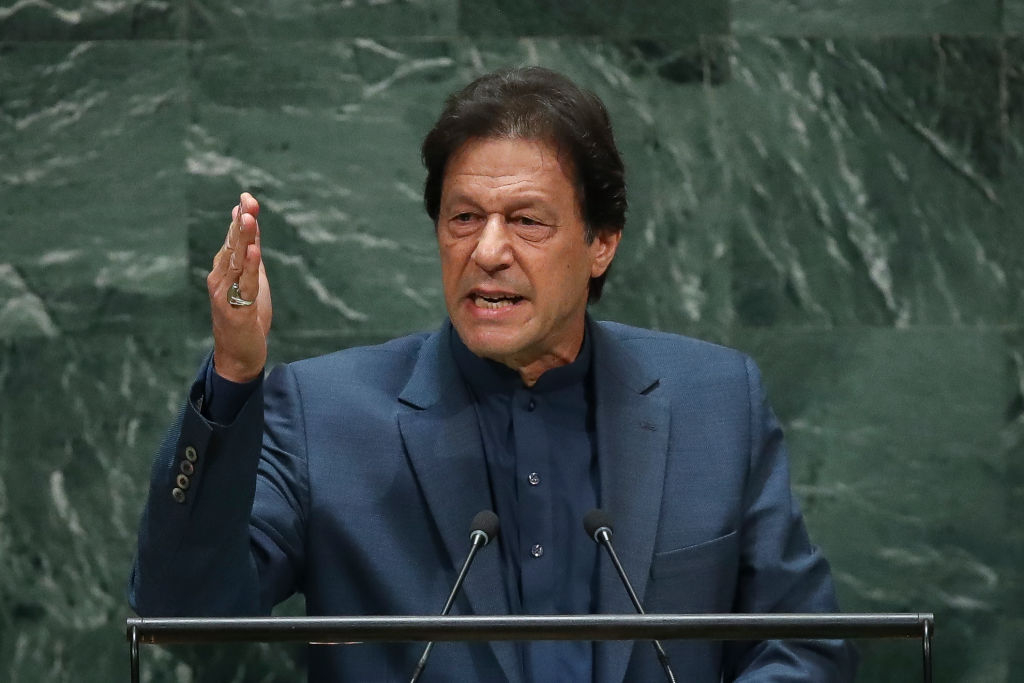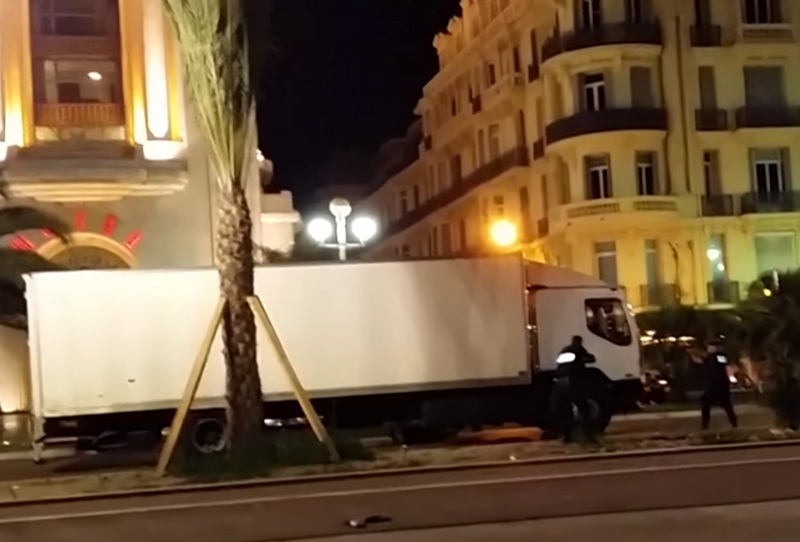“We are on the verge of a civil war.” That quote did not come from a fanatic or a lunatic. No, it came from head of France’s homeland security, the DGSI (Direction générale de la sécurité intérieure), Patrick Calvar. He has, in fact, spoken of the risk of a civil war many times. On July 12th, he warned a commission of members of parliament, in charge of a survey about the terrorist attacks of 2015, about it.

French police shoot dead a Tunisian-born Islamist terrorist who murdered 84 people in Nice, France, July 14, 2016. (Image source: Sky News video screenshot) |
In May 2016, he delivered almost the same message to another commission of members of parliament, this time in charge of national defense. “Europe,” he said, “is in danger. Extremism is on the rise everywhere, and we are now turning our attention to some far-right movements who are preparing a confrontation”.
What kind of confrontation? “Intercommunity confrontations,” he said — polite for “a war against Muslims.” “One or two more terrorist attacks,” he added, “and we may well see a civil war.”
In February 2016, in front of a senate commission in charge of intelligence information, he said again: ” We are looking now at far-right extremists who are just waiting for more terrorist attacks to engage in violent confrontation”.
No one knows if the truck terrorist, who plowed into the July 14th Bastille Day crowd in Nice and killed more than 80 people, will be the trigger for a French civil war, but it might help to look at what creates the risk of one in France and other countries, such as Germany or Sweden.
The main reason is the failure of the state.
1. France is at War but the Enemy is Never Named.
France is the main target of repeated Islamist attacks; the more important Islamist terrorist bloodbaths took place at the magazine Charlie Hebdo and the Hypercacher supermarket of Vincennes (2015); the Bataclan Theater, its nearby restaurants and the Stade de France stadium, (2015); the failed attack on the Thalys train; the beheading of Hervé Cornara (2015); the assassination of two policemen in Magnanville in June (2016), and now the truck-ramming in Nice, on the day commemorating the French Revolution of 1789.
Most of those attacks were committed by French Muslims: citizens on their way back from Syria (the Kouachi brothers at Charlie Hebdo), or by French Islamists (Larossi Abballa who killed a police family in Magnanville in June 2016) who later claimed their allegiance to Islamic State (ISIS). The truck killer in Nice was Tunisian but married to a French woman, whith whom he had three children together, and lived quietly in Nice until he decided to murder more than 80 people and wound dozens more.
After each of these tragic episodes President François Hollande refused to name the enemy, refused to name Islamism — and especially refused to name French Islamists — as the enemy of French citizens.
For Hollande, the enemy is an abstraction: “terrorism” or “fanatics”. Even when the president does dare to name “Islamism” the enemy, he refuses to say he will close all Salafist mosques, prohibit the Muslim Brotherhood and Salafist organizations in France, or ban veils for women in the street and at university. No, instead, the French president reaffirms his determination for military actions abroad: “We are going to reinforce our actions in Syria and Iraq,” the president said after the Nice attack.
For France’s president, the deployment of soldiers in the homeland is for defensive actions only: a deterrent policy, not an offensive rearmament of the Republic against an internal enemy.
So confronted with this failure by our elite — who were elected to guide the country through national and international dangers — how astonishing is it if paramilitary groups are organizing themselves to retaliate?
As Mathieu Bock-Côté, a sociologist in France and Canada, says in Le Figaro:
“Western elites, with a suicidal obstinacy, oppose naming the enemy. Confronted by attacks in Brussels or Paris, they prefer to imagine a philosophical fight between democracy and terrorism, between an open society and fanaticism, between civilization and barbarism”.
2. The Civil War Has Already Begun and Nobody Wants to Name It.
The civil war began sixteen years ago, with the second Intifada. When Palestinians executed suicide attacks in Tel Aviv and Jerusalem, French Muslims began to terrorize Jews living peacefully in France. For sixteen years, Jews — in France — were slaughtered, attacked, tortured and stabbed by French Muslim citizens, supposedly to avenge Palestinian people in the West Bank.
When a group of French citizens who are Muslims declares war on another group of French citizens who are Jews, what do you call it? For the French establishment, it is not a civil war, just a regrettable misunderstanding between two “ethnic” communities.
Until now, no one wanted to establish a connection between these attacks and the murderous attack in Nice against people who were not necessarily Jews — and name it as it should be named: a civil war.
For the very politically correct French establishment, the danger of a civil war will begin only if anyone retaliates against French Muslims; if everyone just submits to their demands, everything is all right. Until now, no one thought that the terrorist attacks against Jews by French Muslims; against Charlie Hebdo’s journalists by French Muslims; against an entrepreneur who was beheaded a year ago by a French Muslim; against young Ilan Halimi by a group of Muslims; against schoolchildren in Toulouse by a French Muslim; against the passengers on the Thalys train by a French Muslim, against the innocent people in Nice by an almost French Muslim were the symptoms of a civil war. These bloodbaths remain seen, to this day, as something like a tragic misunderstanding.
3. The French Establishment Considers the Enemy the Poor, the Old and the Disappointed
In France, who most complains about Muslim immigration? Who most suffers from local Islamism? Who most likes to drink a glass of wine or eat a ham-and-butter sandwich? The poor and the old who live close to Muslim communities, because they do not have the money to move someplace else.
Today, as a result, millions of the poor and the old in France are ready to elect Marine Le Pen, president of the righ-wing Front National, as the next president of the Republic, for the simple reason that the only party that wants to fight illegal immigration is the Front National.
Because, however, these French old and poor want to vote for the Front National, they have become the enemy of the French establishment, right and left. What is the Front National saying to these people? “We are going to restore France as a nation of French people”. And the poor and the old believe it — because they have no choice.
Similarly, the poor and the old in Britain had no choice but to vote for Brexit. They took the first tool given them to express their disappointment at living in a society they did not like anymore. They did not vote to say, “Kill these Muslims who are transforming my country, stealing my job and soaking up my taxes”. They were just protesting a society that a global elite had begun to transform without their consent.
In France, the global elites made a choice. They decided that the “bad” voters in France were unreasonable people too stupid, too racist to see the beauties of a society open to people who often do not want to assimilate, who want you to assimilate to them, and who threaten to kill you if you do not.
The global elites made another choice: they took the side against their own old and poor because those people did not want to vote for them any longer. The global elites also chose not to fight Islamism, because Muslims vote globally for the global elite. Muslims in Europe also offer a big “carrot” to the global elite: they vote collectively.
In France, 93% of Muslims voted for the current president, François Hollande, in 2012. In Sweden, the Social Democrats reported that 75% of Swedish Muslims voted for them in the general election of 2006; and studies show that the “red-green” bloc gets 80-90% of the Muslim vote.
4. Is the Civil War Inevitable? Yes!
If the establishment does not want to see that civil war was already declared by extremist Muslims first — if they do not want to see that the enemy is not the Front National in France, the AfD in Germany, or the Sweden Democrats — but Islamism in France, in Belgium, in Great Britain, in Sweden — then a civil war will happen.
France, like Germany and Sweden, has a military and police strong enough to fight against an internal Islamist enemy. But first, they have to name it and take measures against it. If they do not — if they leave their native citizens in despair, with no other means than to arm themselves and retaliate — yes, civil war is inevitable.
Yves Mamou, based in France, worked for two decades as a journalist for Le Monde.
























